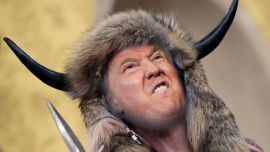A week starting with President Mauricio Macri heading to New York to meet the entire planet at the United Nations General Assembly ends tomorrow with Mendoza’s provincial elections, which might well decide whether he still has any chances of re-election next month. This sequence, in many ways, illustrates a central dilemma for today’s leaders – how to face the mounting challenges of a globalised world while simultaneously recognising that all politics remains local.
Macri deserves credit for his plucky defence of multilateralism at the UN, amid the rampant nationalism represented by such colleagues as Donald Trump and Jair Bolsonaro or Brexit, insisting that “the world is much more an opportunity than a threat” – all the braver given his deflation from G20 supremo to virtual lame duck in the intervening year. Yet paradoxically enough, this valiant advocacy of international free trade comes from the leader of one of the most closed economies in the world – a paradox which goes far towards explaining why the grandeur of his vision is at all odds with the abject failure of his administration.
Yet Macri is not entirely or even mostly to blame – for reasons which go far beyond the “inheritance” of the Kirchnerite decade. If Argentina was forcibly cut off from the rest of the planet by the general collapse of international trade in the depression years of the 1930s, most other countries resumed contact with each other as from World War II (at whose end the UN attended by Macri last Tuesday was created) – first in hostile conflict and then more positive interaction.
But in all those years Argentina marched to the beat of its own drum under the slogan “living off our own” – a tandem of interest groups (protectionist industries, trade unions and their political allies) bent on eliminating all external and internal competition have in the name of “favouring the productive sector” consolidated an economic matrix with low productivity, high prices, mediocre quality and obsolete technology which furthermore has to absorb a heavy tax burden (also falling on exports) and other surcharges.
Politics reared its ugly head to defend this matrix of subsidised business and crony capitalism with such obsessions as sovereignty and strategic industries, while these interest groups gradually colonised a state whose size is in inverse proportion to its performance as a public sector. And therein lies another key to Macri’s failure. With Lionel Messi winning FIFA’s ‘The Best’ prize yet again last Monday, it is often asked why the top-scoring Argentine forwards playing in Europe have such low productivity in the national squad – one reason is that they do not enjoy the same service as from the well-oiled machines of their fabulously wealthy and ultra-professional club teams. By the same token Macri might or might not have “the best Cabinet in 50 years,” as he once boasted, but if the basic state machinery is so deficient, there is scant chance of success.
Yet Macri’s chances would be marginally improved if his Juntos por el Cambio coalition retains Mendoza tomorrow. This provincial election is crucial for both Macri and his Frente de Todos rival Alberto Fernández, even if neither has a direct party colleague in the race – the former is represented by Mendoza City Mayor Rodolfo Suárez seeking to succeed outgoing Radical Governor Alfredo Cornejo (this wine-rich province is the only district apart from Santa Fe without re-election) while the Peronist option is Senator Anabel Fernández Sagasti (yes, another Fernández), a 35-year-old La Cámpora militant who is one of the keenest fans of fellow-senator, former president and Frente de Todos vice-presidential candidate Cristina Fernández de Kirchner.
It is not the aim of this editorial to go into the intricacies of Mendoza local politics (whose importance should never be underestimated) nor to eye the opinion polls (whose credibility was badly tarnished by last month’s PASO primaries) but rather to view tomorrow’s race in the context of this year’s provincial voting. Results to date have strongly favoured incumbents (even Jujuy Radical Governor Gerardo Morales had a double-digit edge despite this year’s anti-government swing) – a factor favouring Macri. But last month’s PASO defeat was virtually nationwide (and not just Peronist strongholds in Greater Buenos Aires, as pundits often conclude), partly because Macri (whose parliamentary weakness led him to give the provinces a far more generous federal revenue-sharing cut than Kirchnerite presidencies ever did) has lost the favour of governors just when he needs it most – because the opposition is now headed by Alberto not Cristina Fernández (the latter never forgiven for her authoritarian centralism) and because of the cuts in public works and now taxes affecting provincial revenues.
Mendoza thus looks too close to call (although it may not be close) – let’s see what tomorrow brings.



















Comments